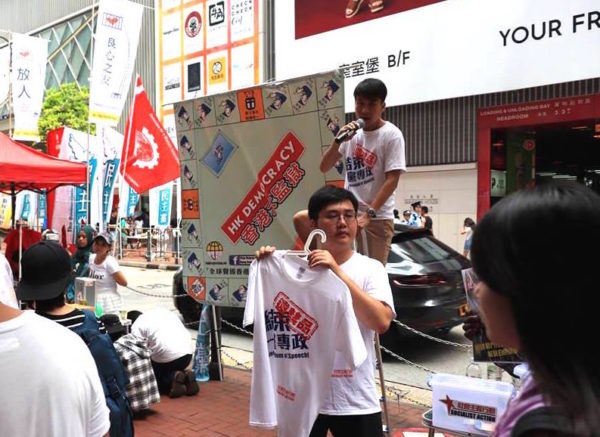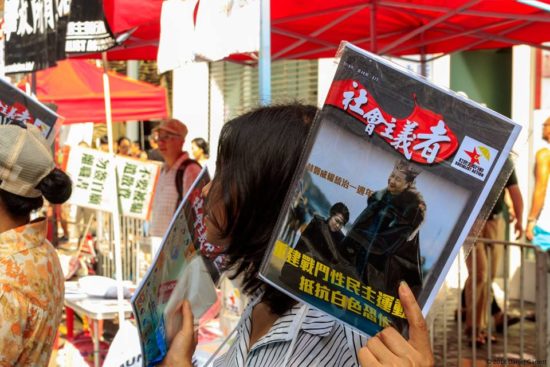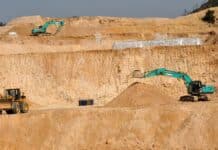Lower numbers reflect need for clear strategy of mass action against authoritarian rule
Socialist Action reporters
For the 16th year running tens of thousands of Hong Kong people turned out on Sunday July 1 for the annual ‘7.1’ anti-government demonstration. The main slogan of the day was “end one-party dictatorship” – a slogan the dictatorship is trying to ban.
July 1 is the anniversary of Hong Kong’s return to Chinese rule after 156 years as a British colony. But since 2003 it has been consecrated as a day of mass protest. This was after a huge mobilisation of 500,000 people that year defeated the government’s attempt to impose ‘Article 23’ national security legislation to severely curtail political and democratic rights. Today, the government is working to revive the ‘Article 23’ legislation along with a raft of other anti-democratic measures.
This year the ‘7.1’ demonstration marked one year in office for Chief Executive Carrie Lam Cheng Yuet-ngor, elected by just 777 votes in a Beijing-controlled election committee. Lam’s rule has seen unprecedented political repression and attacks on democratic rights. These attacks of the local Hong Kong government were on full display in the run up to the ‘7.1’ demo.
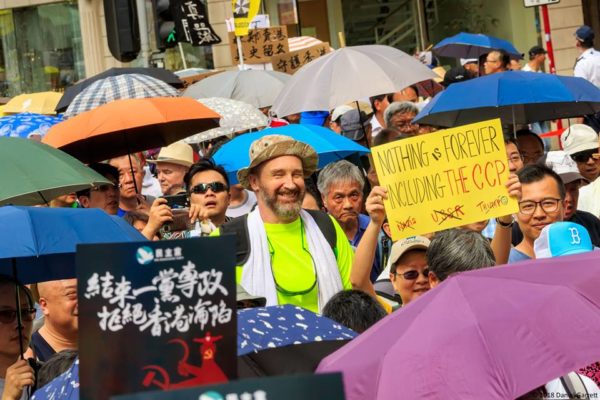
Police refused to allow the march to start from its customary assembly point and instead gave this area to pro-Beijing groups whose application was made later. Police then threatened to arrest marchers if they refused to accept and follow the new more restrictive march route. Huge media coverage in the preceding weeks predicted a showdown between marchers and the police. Meanwhile, Ta Kung Pao, a vitriolic daily owned by the Chinese ‘Communist’ Party dictatorship, called for the demo to be banned altogether claiming it “violates the law and the constitution”.
On the day, there was no clash. The police are not confident that if they provoked a confrontation they would come out on top in terms of public opinion. The police threats of recent weeks were psychological warfare to scare people from joining the march.
The turnout was lower this year, around 50,000, but still a powerful protest. It comes four weeks after 115,000 rallied for the annual June 4 vigil, commemorating the Chinese dictatorship’s massacre of youth and workers fighting for democracy in 1989.
Rather than the government and police propaganda campaign, the main factor limiting the turnout is the lack of a clear lead from the main pro-democracy parties, the pan-democrats, who have been in full-scale political retreat since Lam came to power.
“They have failed to put forward any new strategy of struggle against the authoritarian government,” commented Jaco of Socialist Action. “Despite the weakness of the leadership, 50,000 came out today. If the movement was linked to a clear call for strike action, starting with a one-day citywide strike, and to issue an appeal to mainland Chinese workers and youth, this would get a much bigger echo.”
Election ban
The government and mainstream media have seized upon the lower turnout to ramp up their propaganda campaign. “The smallest turnout ever for July 1,” has been their main theme suggesting that support for the democracy struggle is fading away.
In previous years, the government’s reaction to the ‘7.1’ march has been low-key and circumspect. It would issue a statement saying it “understands” public concerns. This year has been different. The government has gone on the offensive saying slogans against dictatorship are not in the “overall interests” of Hong Kong.
A government press release said “chanting slogans which disrespect ‘one country’ and disregard the constitutional order or which are sensational and misleading was not in line with Hong Kong’s overall interests and would undermine its development.” ‘One country’ is a reference to China’s sovereignty under the ‘one country, two systems’ formula of partial autonomy for Hong Kong.
In particular the government is stepping up pressure against the slogan “end one-party dictatorship”. They are lining up to force opposition election candidates to disavow this slogan or be banned from standing. This propaganda does not much affect the mood of ordinary workers and youth whose anger is growing, but it can terrify the ‘moderate’ pan-democrats who are anyway uncomfortable with the concept of mass struggle and want to avoid a fight with the government at any cost.
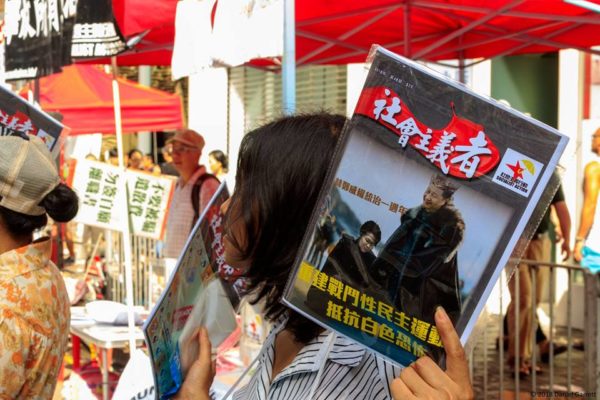
New attacks on democratic rights are pummelling Hong Kong as the local government and Beijing attempt to incapacitate the democracy movement. The struggle for democratic rights in Hong Kong, since before 2003 and in fact stretching back to the 1989 mass struggle in China, has mobilised millions – in a city of 7.3 million.
The Umbrella Revolution of 2014 saw 1.2 million take part in rallies, occupations and anti-government protests during a record 79-day standoff. This movement was the biggest political challenge to the Chinese dictatorship, now under absolute ruler Xi Jinping, since the mass movement of 1989. The government’s repressive measures today are an attempt to prevent any repetition, but this is ultimately doomed to fail especially when political developments in China catch up with, and quite possibly surpass, those in Hong Kong.
Socialist Action ran stalls along the route of the ‘7.1’ demonstration with the new issue of Socialist (社會主義者) magazine.
“Our slogans for the demo were ‘Rebuild a fighting democratic movement’ and ‘Down with dictatorship’,” said Jaco of Socialist Action. “We link this to the need for a mass workers’ party with socialist policies and to spread the mass struggle to China,” he said.
“Our message is that the anti-authoritarian struggle also needs to be anti-capitalist – that is the only way to defeat the dictatorship.”
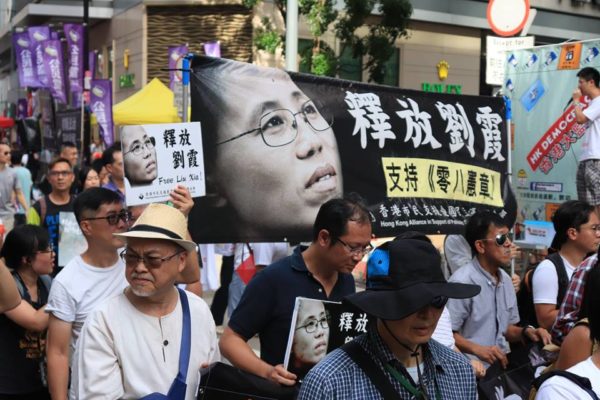
Timeline of Carrie Lam’s 1st year in power
July 1, 2017: Carrie Lam sworn in. Xi Jinping speaking in Hong Kong warns the people not to cross Beijing’s “red lines” and denounces those who call for independence.
July 14, 2017: Four pro-democracy legislators disqualified from the Legislative Council (Legco) in an undemocratic purge. Among them is ‘Long Hair’ Leung Kwok-hung of the League of Social Democrats (LSD), a veteran of the democracy struggle. This followed the exclusion of two ‘localist’ (Hong Kong nationalist) legislators six months earlier. Lam’s government has thus thrown one-fifth of the opposition legislators out of the Legco, overturning the results of the 2016 election.
July 25, 2017: Government announces ‘co-location’ plan for the new high-speed railway to China – ostensibly to “save time” mainland police and immigration officials will operate legally in Hong Kong for the first time.
Read more ➵ Q & A on the Hong Kong government’s crackdown
August 15 and 17, 2017: Two court cases against Umbrella activists and land rights protesters result in the first significant jail sentences for young democracy activists. Sixteen defendants are jailed for terms of six to 13 months, including Joshua Wong Chi-fung of student party Demosisto, and Raphael Wong Ho-ming of LSD. The sentences overturn lighter sentences that the 16 had already served.
August 20, 2017: Called at just a few days’ notice after the trials of the sixteen, 140,000 people turn out to protest the jailings and the government’s manipulation of the courts. The huge turnout is completely unforeseen by the main pan-democratic parties who tail-end a demonstration they did not initiate.
October 1, 2017: National Anthem Law is promulgated by the Standing Committee of the National People’s Congress (NPC) in China, which prescribes punishments for “insults”. The Hong Kong government announces it will introduce the law in Hong Kong. The new law targets young people especially, such as Hong Kong football supporters who have routinely booed when the Chinese national anthem is played at international games.
December 15, 2017: Legco votes to “castrate” itself. The pro-government super-majority, enhanced by the disqualifications of opposition members, railroads through rule changes that curtail the rights of the opposition to delay or scrutinise government legislation.
2018: The government’s “lawfare” against pro-democracy protesters intensifies. Journalist Kong Tsung-gan reports, “In January, there were six trials of 43 defendants; in February, six of 27; in March, eight of 46; in April, five of 27; and in May, three of 21. Since the start of 2018, more than three years after the Umbrella Movement concluded, there have been four movement-related trials of 47 defendants, sending the overall number of those tried to at least 266 and the number convicted to at least 100.
January 17, 2018: 16 defendants are found guilty of ignoring a court injunction during the clearance of the Mong Kok Occupy protest site at the end of the Umbrella Movement in 2014. The 16 all face prison sentences, including Joshua Wong and Raphael Wong who have already received prison terms at the August 2017 trials. The 16 have appealed against the judgement.
January 27, 2018: 21-year-old Agnes Chow Ting of Demosisto is banned from standing in the Legco by-election to replace her party colleague Nathan Law Kwun-chung, one of six disqualified legislators. The ban by ‘impartial’ election officials claims Chow is ineligible because her party manifesto calls for “self determination”. No objection had been raised when Law stood and was elected in 2016.
March 11, 2018: Legco by-elections to fill four seats left vacant by the government’s purge. Two seats are won by the pan-democrats and two by the pro-government camp. Three candidates have been banned from standing. After the elections, which the pro-government camp claim as a victory, Tam Yiu-chung, Hong Kong’s only member of China’s NPC Standing Committee says anyone calling to “end one-party dictatorship” is ineligible to run in elections.
Read more ➵ Stop political persecution of ‘Long Hair’
March 16, 2018: The government announces it is drafting the National Anthem Bill to implement China’s National Anthem Law in Hong Kong. It proposes fines of HK$50,000 and up to three years in jail for “disrespecting” the anthem.
March 17, 2018: Xi Jinping sworn in as China’s president for a second term after the NPC votes to abolish term limits, opening the way for “lifetime rule”. This shift from a more ‘collective’ dictatorship model reinforces the repressive direction of Xi’s regime. But it also triggers large-scale unexpected protests from among China’s 770 million internet users.
March 30, 2018: Government issues a statement “strongly condemning” a speech by university professor Benny Tai Yiu-ting which vaguely broached the idea of an independent Hong Kong among other future scenarios. Pro-government figures call for Tai to be prosecuted and sacked from his job. Tai’s speech, made at a forum in Taiwan a few weeks earlier, was turned into a punch bag for the establishment campaign to restrict free speech and prepare public opinion for a new crack at introducing ‘Article 23’ national security legislation.
May 28, 2018: LSD chairman Avery Ng sentenced to four months in prison for revealing the identity of a senior government official who was under investigation by Hong Kong’s anti-corruption bureau (ICAC). The court rejects Ng’s defence that his disclosure was of “significant public interest”. The harsh sentence is yet another political landmark and confirms a government vendetta against the radical LSD as part of its wider crackdown.
June 11, 2018: Prominent former Hong Kong independence advocate and ‘localist’ Edward Leung Tin-kei is sent to prison for six years in an unprecedentedly harsh judgement. With Leung this brings to 25 the number of mostly young defendants found guilty for involvement in the Mongkok ‘riot’ of 2016. The 25 have received a combined prison term of 71 years.
Read more ➵ Shock and anger at six-year jail sentence for Edward Leung
June 14, 2018: The Legco passes the government’s co-location bill giving the green light for a massive China-controlled police station at the West Kowloon Terminus of the soon-to-be-opened high-speed railway line to Guangzhou. Pan-democrat opposition is stifled by unprecedented restrictions imposed by Legco president Andrew Leung Kwan-yuen and the pro-government Legco majority.
